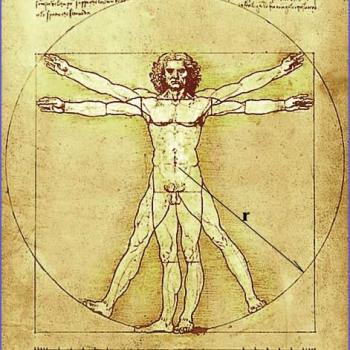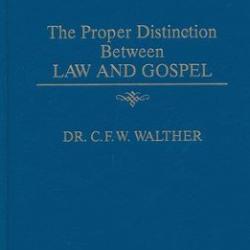
+++
Is Radical Lutheranism the Answer? (Part 1)
Note: Most of the series which follows will be found on my own blog theology like a child. I hope you’ll join me there for all the subsequent parts.
You like Gerhard Forde? You want to embrace the “Radical Lutheran” label? I think I get it. Really, I do.
At one point in my life, I also thought that Gerhard Forde was a terrific theologian — perhaps just the kind of voice contemporary Lutherans (more: all contemporary Christians!) needed to be paying attention to.
First time I heard of Forde was from a St. Louis vicar, 2001. Said he was all the rage on campus. I bought in hook, line, and sinker. Took me years of careful discernment to recover.
— Clint K Poppe (@ClintKPoppe) October 12, 2018
Who else, after all, was talking about the Bondage of the Will – which the great church reformer Martin Luther had said was one of his two most important works – in a really serious way?
- Who else had paid close attention to the theses that Martin Luther had written vs the “antinomians” (those against the law) – no doubt, given his Roman Catholic opponents’ accusations versus him, one of Luther’s more intriguing works!? (yes, I know, Forde’s loyal friend, another ELCA theologian Jim Nestingen, had done this as well)
- Who else fixated on the cross of Christ like they, and actually took the time to carefully unpack what Luther meant in the Heidelburg Disputation by “theology of the cross” (vis a vis the “theology of glory”)?
- Who else dealt with the reality, in its depths – of the very real presence of sin remaining in the Christian – and gave us the only answer that we continually needed to stay Christian and grow as Christians!
- Who else seemed to actually care about reading Luther, and the scholarship coming out on Martin Luther – even the recent stuff in Germany?
- Who else but Gerhard Forde – the kind of spiritual giant we needed to show us God’s radical law and radical grace… that there might be real life for the world!
I don’t think the above anymore. In fact, I now think that I was taken for a ride. Truth be told, even at the time when I was apt to embrace much of what Forde wrote, I always did have some lingering reservations….

Let me start by telling you a short story from my previous life in seminary…
Way back in 2000, I dropped out of the conservative Lutheran seminary I was attending, largely because I was not sure if I could adhere to the 1580 Book of Concord (I was seriously considering women’s ordination and other things at the time).[i] One of the most vivid memories of my brief time there though was when I was reading through the book of Romans near the end of my second year. Coming to chapter 8, I was absolutely shocked by what I read there in verses 3 and 4:
For God has done what the law, weakened by the flesh, could not do. By sending his own Son in the likeness of sinful flesh and for sin, he condemned sin in the flesh, in order that the righteous requirement of the law might be fulfilled in us, who walk not according to the flesh but according to the Spirit.
After two years imbibing the content of contemporary confessional Lutheran seminaries, I had fully expected to read “in order that the righteous requirement of the law might be fulfilled in Him,” that is, Jesus Christ – for our justification! But now, after having been thoroughly indoctrinated into modern Lutheranism — a Lutheranism I now recognize had been quite influenced by men like Gerhard Forde — I actually had a hard time wrapping my head around the idea that Paul could write like this! (no, I am not saying that Radical Lutherans do not have their own way of making sense of this passage, just that I had not seen the passage addressed in the core things I had read).

Fast-forward to about four years later, and I was blessed to have a pastor whose friend, Pastor Holger Sonntag, had begun to translate Martin Luther’s Antinomian Disputations, which discussed and debated the theses verses the antinomians mentioned above.
Strange as it may sound to the ears of many, it came as a relief to me as I read that early manuscript in 2004. There I saw Luther not only heartily acknowledging the existence of Romans 8:3-4, but bringing those verses alive in a way which clearly fit with other emphases in Lutheran theology! He seemed to understand the depths of the Christian life in a way that had escaped me. My prayer is that as you check out this series I’ve written, the Antinomian Disputations of Martin Luther will speak to you in a similar way.
"Our nature is such that we always desire new things. We are not content with the doctrine that has been handed down and received. And because the devil knows that our nature is like this, he attacks it with his snares and introduces his light." — Luther, AE 33, 229
— Theology Like a Child (@Infanttheology) October 12, 2018
In the course of the posts which follow, I will put these writings of Luther into conversation with some of the writings of contemporary Lutheran theologians like Jim Nestingen, Steve Paulson, and Nicholas Hopman. I spend the most time with Hopman, who is Steve Paulson’s student (who in turn was Gerhard Forde’s student) and who would qualify and identity as a “Radical Lutheran”.
In other words, Hopman clearly believes that Gerhard Forde, an author of an essay by the same name, is an excellent and faithful guide for Christians. Following in Forde’s train, Hopman attempts to pass on this message – which he believes is also faithful to Martin Luther’s.
I contend that one of the main problems Radical Lutherans have is that they do not really take into account the robust view of man that their forbearer Martin Luther had.[ii] For Luther, it is very important that man was created with the capacity to do God’s law and enjoyed doing so. Reading Radical Lutherans though, not only is the “very good” nature of man in the garden – or at least the relevance of this fact – called into question (including by Forde himself)[iii], but one is also given the clear impression that Adam and Eve would have felt threatened by God’s law even in the Garden of Eden.[iv] While it is certainly true that Luther talks about God’s initial commandment given to our first parents as a threat, he also gives no indication that such a threat would have terrified or accused them, and in fact, gives the exact opposite impression.

These are the fundamental – and wonderful – truths that underlie the other issues that are explored in the series of blog posts which follow.
In several of the posts which immediately follow, I will be including some quotations from Martin Luther’s Antinomian Disputations (in the very first series of disputations, held in 1537). These will be the jumping off points for the meditations in the posts.

Below, for example, is the full set of theses from the first of the Antinomian Disputations. It is a bit heavy-going – and might sound a bit foreign to modern Christian ears – but I urge you to embrace the challenge and to check them out. I have highlighted in bold the ones I think receive a good amount of attention in this series:
Disputation of Dr. Martin Luther against Certain Antinomians
- According to the testimony of all, and in fact, repentance is sorrow on account of sin with the added intention of a better life.
- Properly speaking, sorrow is nothing else—and cannot be anything else—than the touch or feeling of the law in the heart or the conscience.
- For many certainly hear the law, but because they do not experience the feeling or power of the law, they do not feel any sorrow on account of anything nor do they repent.
- The first part of repentance, sorrow, is caused solely by the law. The second part, the good intention, cannot be caused by the law.
- For a man terrified by sin cannot intend good out of his own powers, since not even the one at rest or in security can do this.
- Yet confused and engulfed by the power of sin he falls into despair and hatred of God, or descends to hell, as Scripture says.
- This is why the promise or the Gospel needs to be added to the law, which sets the conscience at peace and lifts it up, so that it may intend the good.
- Repentance solely caused by the law is one half or beginning of repentance, or is repentance synecdochically speaking, since it lacks the good intention.
- And if it stops there, then takes place the repentance of Cain, Saul, Judas, and all who distrust and despair of God’s mercy, that is, that of those who perish.
- From the fathers, the Sophists have received and taught as definition of repentance that it is sorrow and intention etc.
- Yet neither did they understand the parts of the definition, namely, sorrow, sin, intention, nor could they teach it.
- They imagined sorrow to be an act elicited by the power of the free will, which despises sin as often as it wills or does not will.
- In reality, this sorrow is suffering or affliction, which conscience willy-nilly is forced to suffer by the law as it touches and torments it.
- They imagined that sin is that which is against human traditions, only rarely that which is against the moral law.
- Original or post-baptismal sin they did not even consider to be sin, especially in the First Table.
- Against this chaff the law, this hammer of God—as Jeremiah says—that smashes rocks (Jer. 23:29), has confined all men under sin (Gal. 3:22).
- Good intention they thought to be the resolution chosen by human powers regarding the avoiding of sin in the future.
- In reality, according to the Gospel, it is an impetus of the Holy Spirit that immediately detests sin out of love, although meanwhile sin strongly rebels in the flesh.
- Their ignorance is not surprising, since they, having set aside Scripture, could not know what the law and what the Gospel is.
- For they were utterly immersed in precepts and mandates of men so that they based their judgment concerning holy and divine matters on dreams.
- Against these useless teachers of despair the Gospel begins to teach that repentance ought not to be just despair.
- But those who repent ought to entertain hope, and in this way, out of love of God, hate sin, which is really what a good intention means.
- Some, inconsiderate of the theme at hand or of the subject matter, wanted this to be said against God’s law.
- And they taught dangerously that the law of God is to be removed from the Church, which is blasphemy and a sacrilege.
- For the entire Scripture teaches that repentance must be initiated by the law, which is what the order of the matter itself and also experience shows.
- “All who forget God—it says—shall be turned into hell,” and: “Place, O Lord, a lawgiver over them that men may know etc.”
- “Fill their faces with shame, and they will seek your name, O Lord” (Ps. 83:16). And, “The sinner is caught in the works of his hands” (Ps. 9:16).
- The order of the matter is that death and sin are in nature before life and righteousness.
- For we are neither righteous nor alive, to be delivered to sin or death; but we are already sinners and dead on account of Adam, to be declared righteous and alive by Christ.
- This is why Adam—that is, sin and death—needs to be taught first; he is a type of the coming Christ (Rom. 5:21) who is to be taught afterwards.
- Sin, however, and death necessarily must be pointed out, not by the word of grace and comfort, but by the law.
- As experience shows, Adam first is convicted as transgressor of the law, then he is lifted up by the promised Seed of the woman etc. (cf. Gen. 3:11, 15).
- And David first is killed by the law through Nathan who says (2 Sam. 12:7): “You are the man etc.;” later he is saved by the Gospel that says (2 Sam. 12:13): “You shall not die etc.”
- Paul, thrown down by the law, first hears (Acts 9:4): “Why are you persecuting me?” Then he is declared alive by the Gospel (Acts 9:6): “Rise etc.”
- And Christ himself says in Mark 1(:15): “Repent and believe the Gospel, for the kingdom of God is at hand.”
- Again (Luke 24:47): “repentance and remission of sins should be preached.”
- Thus also the Spirit first convicts the world of sin in order to teach faith in Christ, that is, the remission of sins (John 16:8).
- Paul, in his letter to the Romans, follows this method, when he first teaches that all are sinners, to be declared righteous by Christ.
- Luke likewise testifies in Acts that Paul taught Jews as well as Gentiles that no one can be declared righteous except by Christ. And the things that follow.
FIN
Notes:
[i] Another thing I was considering was that the active obedience of Christ really had nothing to do with the atonement of Christ. Sure, it was important that the lamb be pure to be worthy to be slain, but that was the only point I saw in the active obedience. As I recall, when I studying Anselm on the atonement, I read works critical of him by scholars who had been influenced by Forde.
[ii] See my response to Hopman’s paper, “Luther’s Antinomian Disputations and lex aeterna,” in the summer 2016 issue of Lutheran Quarterly, here.
[iii] See Cooper, Lex Aeterna, pp. 119-120, where he discusses this based on Forde’s book “Theology is for Proclamation”.
[iv] In which case, the Eden story becomes just another “law story” Paulson and Hopman talk about!: “Because the world’s master narrative is the law, every story of the world – other than Christ’s – ends with a direct or implied threat….” More: “All legal tales have a threat buried in them.” (“Hated God”, 9). For more on the “legal schem,” see also Paulson, Lutheran Theology, 2.












